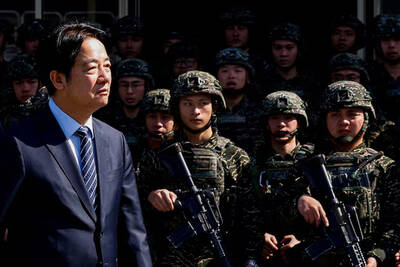Taiwan must improve protections for lower-wage migrant workers if it hopes to be recognized as a developed country, academics said, after the US suspended imports from Giant Manufacturing Co over allegations of forced labor.
Chen Li-yi (陳立儀), an assistant professor in the Department of Labor and Human Resources at Chinese Culture University, said in a recent media interview that if Taiwan wishes to be regarded as a developed nation, “it must ensure the protection of migrant workers’ human rights.”
US Customs and Border Protection issued a withhold release order against Giant last year, aiming to prompt Taiwan’s leading bicycle maker to improve working conditions for migrant workers, Chen said.

Photo: CNA
Taiwan’s migrant worker management system is based on government-to-government arrangements, unlike in most advanced economies where employment is governed by direct contracts between private companies and workers, he said.
Citing Taiwan Semiconductor Manufacturing Co’s operations in the US, Chen said cultural differences also influence workplace expectations and labor conditions.
“Many Taiwanese believe paying overtime to speed up progress is reasonable,” he said, “but American workers see holidays as time for rest.”
Lin Chun-yu (林君諭), assistant professor in the Department of Social Work at Soochow University, said that migrant workers in Taiwan’s industrial sector generally have better protections than those employed as caregivers or in fisheries.
Taiwan’s approach to migrant worker rights “has really improved,” but still leaves “room for progress,” she said, adding that some workers still have to pay high brokerage fees in their home countries under the quota system.
In response to the US order, Giant said it “absolutely has no debt-bonded labor” and “has never abused the disadvantaged status of migrant workers.”
Wages are paid within five days after each pay period, with bilingual payslips and legally calculated overtime pay, the company said, adding that its working environment meets ISO 45001 and Taiwan Occupational Safety and Health Management System standards.
Dormitories exceed legal space requirements and are equipped with air conditioning and bilingual management staff, Giant said, adding that it has hired legal counsel and would meet with US representatives “to explain the actual situation.”
Minister of Economic Affairs Kung Ming-hsin (龔明鑫) last week said that Taiwan has continually improved conditions for migrant workers, adding that the ministry would coordinate with the Ministry of Labor to issue clearer guidelines for improving living and working environments.
Giant said it implemented a “zero recruitment fee” policy in January, under which the company covers all recruitment, brokerage and government fees for newly hired foreign workers.

The Taipei Mass Rapid Transit (MRT) Wanda-Zhonghe Line is 81.7 percent complete, with public opening targeted for the end of 2027, New Taipei City Mayor Hou You-yi (侯友宜) said today. Surrounding roads are to be open to the public by the end of next year, Hou said during an inspection of construction progress. The 9.5km line, featuring nine underground stations and one depot, is expected to connect Chiang Kai-shek Memorial Hall Station to Chukuang Station in New Taipei City’s Jhonghe District (中和). All 18 tunnels for the line are complete, while the main structures of the stations and depot are mostly finished, he

The first global hotel Keys Selection by the Michelin Guide includes four hotels in Taiwan, Michelin announced yesterday. All four received the “Michelin One Key,” indicating guests are to experience a “very special stay” at any of the locations as the establishments are “a true gem with personality. Service always goes the extra mile, and the hotel provides much more than others in its price range.” Of the four hotels, three are located in Taipei and one in Taichung. In Taipei, the One Key accolades were awarded to the Capella Taipei, Kimpton Da An Taipei and Mandarin Oriental Taipei. Capella Taipei was described by

Minister of Economic Affairs Kung Ming-hsin (龔明鑫) yesterday said that private-sector refiners are willing to stop buying Russian naphtha should the EU ask them to, after a group of non-governmental organizations, including the Centre for Research on Energy and Clean Air (CREA), criticized the nation’s continued business with the country. While Taiwan joined the US and its Western allies in putting broad sanctions on Russia after it invaded Ukraine in 2022, it did not explicitly ban imports of naphtha, a major hard-currency earner for Russia. While state-owned firms stopped importing Russian oil in 2023, there is no restriction on private companies to

President William Lai (賴清德) is expected to announce a new advanced “all-domain” air defense system to better defend against China when he gives his keynote national day speech today, four sources familiar with the matter said. Taiwan is ramping up defense spending and modernizing its armed forces, but faces a China that has a far larger military and is adding its own advanced new weapons such as stealth fighter jets, aircraft carriers and a huge array of missiles. Lai is expected to announce the air defense system dubbed “Taiwan Dome” in his speech this morning, one of the sources said. The system